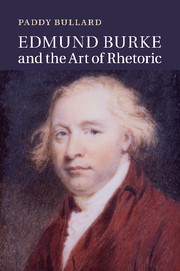Book contents
- Frontmatter
- Contents
- Acknowledgements
- Abbreviations
- Introduction: Burke, rhetoric and ethics
- 1 The ethical turn in early modern rhetoric, 1600–1760
- 2 Rhetoric in Ireland, 1693–1765
- 3 The Epicurean aesthetics of the Philosophical Enquiry
- 4 Episodes in the evolution of Burke's eloquence
- 5 Reflections on the Revolution in France and the rhetoric of character
- 6 Burke, Rousseau and the purchase of eloquence
- Conclusion
- Notes
- Bibliography
- Index
- References
Bibliography
Published online by Cambridge University Press: 01 June 2011
- Frontmatter
- Contents
- Acknowledgements
- Abbreviations
- Introduction: Burke, rhetoric and ethics
- 1 The ethical turn in early modern rhetoric, 1600–1760
- 2 Rhetoric in Ireland, 1693–1765
- 3 The Epicurean aesthetics of the Philosophical Enquiry
- 4 Episodes in the evolution of Burke's eloquence
- 5 Reflections on the Revolution in France and the rhetoric of character
- 6 Burke, Rousseau and the purchase of eloquence
- Conclusion
- Notes
- Bibliography
- Index
- References
- Type
- Chapter
- Information
- Edmund Burke and the Art of Rhetoric , pp. 242 - 266Publisher: Cambridge University PressPrint publication year: 2011



